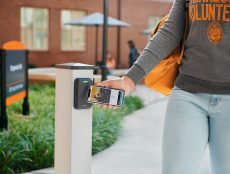
Articles
Industry News
Interviews
Axonify Is Using AI to Transform Retail Training
By Cait Etherington
July 16, 2019
Artificial intelligence (AI) is currently being embraced as a solution to a wide range of problems. Indeed, from traffic congestion to literacy, there are high hopes that AI can help. It is not entirely surprisingly, then, that AI is also being embraced as a way to solve a widespread workplace challenge–training in the retail industry. eLearning Inside recently talked to Carol Leaman, the CEO of Axonify, to find out how her company is leveraging AI to help tackle retail training challenges and reduce the high rate of churn that has historically plagued the retail sector.
Low Retention Rates and Training Challenges in Retail
Retail has historically had one of the lowest retention rates of any industry. The industry’s high turnover has been the result of several key factors. First, many retail positions are seasonal. Second, retail positions are often viewed as entry-level jobs or as a stepping stone to a higher position. Finally,retailers have often struggled to retain employees due to the industry’s low wages (according to the Bureau of Labor Statistics, in 2018, the mean average annual salary for a retail associate was just $24,340), limited benefits, and lack of training and advancement opportunities. But according to Leaman, the situation may be getting worse as automation continues to disrupt the retail industry on multiple levels.
“There are numerous challenges retailers are facing today when it comes to training their frontline associates,” says Leaman. Notably, a recent Korn Ferry survey of 53 retailers who collectively employ more than 2 million employees found that turn over, specifically among part-term employees, rose 5% between 2017 and 2018.
How AI Is Transforming the Retail Sector
“Basic tasks like taking inventory or checking out customers will be outsourced to technology as machines can handle these tasks with higher consistency and accuracy. The human connection, one where the retail associate knows you personally and can guide your shopping experience assisted by AI, will help with product recommendations and real-time inventory analytics. What’s really exciting is that by blending the use of technology and human interaction retailers can provide the best customer experience to meet expectations. The future associate is mobile trained and equipped to provide a consistently seamless retail experience to each customer that walks through the door.”
From Ad-hoc to Personalized Training With Axonify
“This can include bursts of learning content for general onboarding, customer service best practices, the latest technologies and features in your newest product, proper basket-building approaches or even tips to identify credit card or return fraud. In a few minutes a shift, modern training platforms can personalize and adapt training to each employee based on which topics they are proven experts in and which areas of the training they need reinforced.”
Axonify’s Approach to Retail Training
Recognizing the need for consistent yet personalized training for sales staff, the Axonify platform uses AI to offer what Leaman describes as a “deeply personalized learning experience for every frontline employee.” But Axonify’s platform isn’t just personalized. As Leaman notes, it was designed to “measure what has long been unmeasurable—the true impact of training on bottom-line business results.”
This is essential, since retail staff all bring a unique toolkit of skills to the job. “Every new hire starts with a different level of experience and knowledge,” says Leaman. “By adapting the training experience to each individual, retailers can pinpoint what each employee knows, and doesn’t know, and continually provide reinforcement of key topic areas to close those gaps. The end result is a more engaging training experience for the associate since the information is relevant to their role and needs. All of this translates into more consistent behaviors across stores.”Leaman notes that Axonify has been designed to support organizations of all sizes and to support employees from the frontline to head office. Axonify is also currently undergoing a period of ambitious research and development and expansion.









One Comment